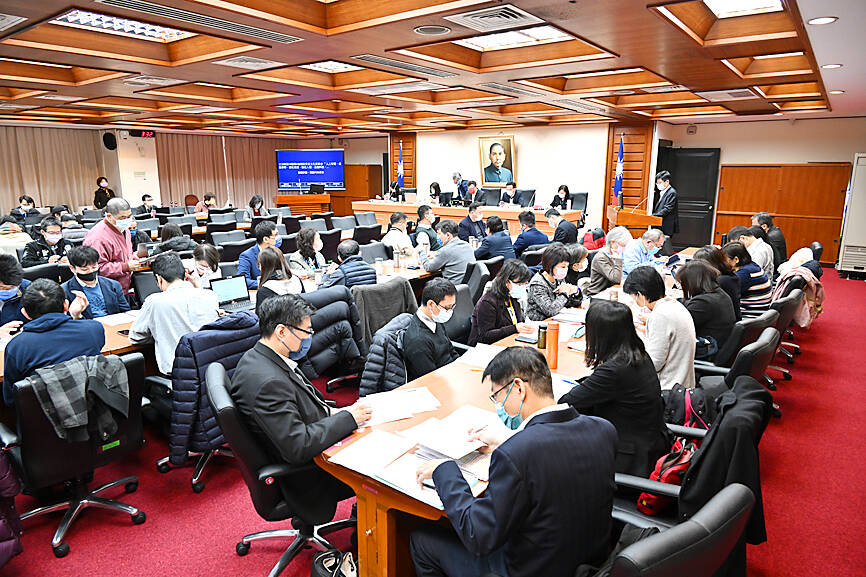More than 8,000 people aged 18 to 23 were implicated in fraud cases in the first 10 months of this year, up 20 percent year-on-year and outstripping the number of fraud victims in the same age group, the legislature’s Education and Culture Committee said yesterday.
The committee held a public hearing on fraud and money laundering on campuses, discussing topics such as artificial intelligence, cryptocurrency, digital assets, digital human rights, fintech and the metaverse.
In the first 10 months this year, there were 8,207 fraud suspects aged 18 to 23, accounting for 21.87 percent of fraud suspects in all age groups, Democratic Progressive Party Legislator Michelle Lin (林楚茵) said, adding that there were only 7,442 fraud victims in the same age group.

Photo: Tu Chien-jung, Taipei Times
The age group includes university graduates who are about to enter the workforce, but might make bad choices due to ignorance, she said.
She underlined the importance of media literacy in an ever-changing digital world, urging the government to propose measures to prevent people from being scammed or becoming an accomplice to scams.
Chinese Nationalist Party (KMT) Legislator Cheng Cheng-chien (鄭正鈐), who chaired the meeting, called on the Ministry of Education to provide education on the metaverse, digital assets and financial technology in colleges and universities.
The courses should help students to acquire a good understanding of the fields, develop expertise in related industries and prevent them from being scammed, he said.
The ministry should propose feasible plans and provide financial subsidies, he added.
Department of Student Affairs and Special Education Director Wu Lin-hui (吳林輝) said that the ministry is in charge of “identifying scams” in the Executive Yuan’s anti-fraud action plan.
The Cabinet approved the plan on July 15 to tackle fraud from four angles: identifying, blocking, preventing and punishing, he said.
The Ministry of the Interior, the National Communications Commission, the Financial Supervisory Commission, the Ministry of Justice and the education ministry are working together on the action plan, he added.
As students come from a range of backgrounds, they might fall victim to fraud for different reasons, he said, adding that they should be taught to identify scams with methods designed for their specific age group and circumstances.
College and university students are most likely to fall for scams involving cryptocurrency investments, online shopping and canceling ATM installment payment plans, he said.
National Education Radio has cooperated with the education ministry to produce five anti-fraud educational programs and 20 news reports, and has run anti-fraud advertisements 50 times, he said.
The education ministry has also worked with universities to provide courses for teachers on rule of law education, he said.
Industry insiders and academics have said that actions combating fraud should be more in line with international standards, Cheng said.
They have advised the education ministry and Ministry of Digital Affairs to organize summer or winter camps to combat fraud and money laundering, as well as international seminars and lectures to exchange ideas with experts from around the world, he said.

A strong continental cold air mass and abundant moisture bringing snow to mountains 3,000m and higher over the past few days are a reminder that more than 60 years ago Taiwan had an outdoor ski resort that gradually disappeared in part due to climate change. On Oct. 24, 2021, the National Development Council posted a series of photographs on Facebook recounting the days when Taiwan had a ski resort on Hehuanshan (合歡山) in Nantou County. More than 60 years ago, when developing a branch of the Central Cross-Island Highway, the government discovered that Hehuanshan, with an elevation of more than 3,100m,

Death row inmate Huang Lin-kai (黃麟凱), who was convicted for the double murder of his former girlfriend and her mother, is to be executed at the Taipei Detention Center tonight, the Ministry of Justice announced. Huang, who was a military conscript at the time, was convicted for the rape and murder of his ex-girlfriend, surnamed Wang (王), and the murder of her mother, after breaking into their home on Oct. 1, 2013. Prosecutors cited anger over the breakup and a dispute about money as the motives behind the double homicide. This is the first time that Minister of Justice Cheng Ming-chien (鄭銘謙) has

TRANSPORT CONVENIENCE: The new ticket gates would accept a variety of mobile payment methods, and buses would be installed with QR code readers for ease of use New ticketing gates for the Taipei metro system are expected to begin service in October, allowing users to swipe with cellphones and select credit cards partnered with Taipei Rapid Transit Corp (TRTC), the company said on Tuesday. TRTC said its gates in use are experiencing difficulty due to their age, as they were first installed in 2007. Maintenance is increasingly expensive and challenging as the manufacturing of components is halted or becoming harder to find, the company said. Currently, the gates only accept EasyCard, iPass and electronic icash tickets, or one-time-use tickets purchased at kiosks, the company said. Since 2023, the company said it

Ferry operators are planning to provide a total of 1,429 journeys between Taiwan proper and its offshore islands to meet increased travel demand during the upcoming Lunar New Year holiday, the Maritime and Port Bureau said yesterday. The available number of ferry journeys on eight routes from Saturday next week to Feb. 2 is expected to meet a maximum transport capacity of 289,414 passengers, the bureau said in a news release. Meanwhile, a total of 396 journeys on the "small three links," which are direct ferries connecting Taiwan's Kinmen and Lienchiang counties with China's Fujian Province, are also being planned to accommodate